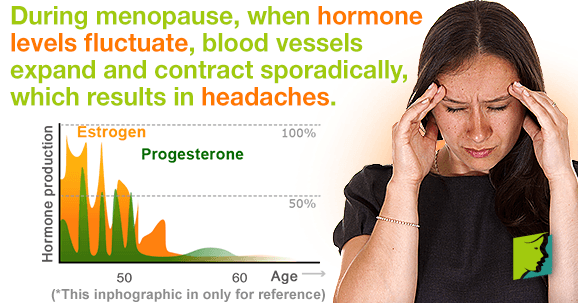Headaches may begin as only a mild throbbing in the head or a slight sensitivity to light and sound, but they can quickly escalate to debilitating pain. The majority of people experience headaches at some point in their lives, but during menopause, women are particularly susceptible to them. Ranging from mildly distracting to seriously disabling, headaches have the potential to encroach upon your well-being, especially when they occur on a regular basis. Keep reading to learn more about different types of headaches a woman is likely to experience during menopause and what causes them.
What Types of Headaches Am I Likely to Experience?
There are three primary types of headaches that women commonly experience during perimenopause (i.e., the years just prior to menopause): tension headaches, sinus headaches, and migraines.
Tension headaches
They are the most common form of headache - also known as “everyday headaches” - and can last from 30 minutes to several hours. The pain has been likened to a tight band around the skull, though throbbing may also occur in the back of the neck and base of the skull during a tension headache.
Sinus headaches
They are characterized by a feeling of facial tenderness and congestion around the forehead, eyes, and upper cheeks, where inflammation or blockage of the sinuses results in a dull throbbing in the sinus cavities.
Migraines
These are the most intense and debilitating form of headache. They can last for several hours, and are often preceded by nausea or vomiting and sensitivity to light, sound, or odor.
Headaches and Menopause
Although doctors are uncertain of the exact cause of headaches during menopause, it is agreed that the links between hormones and headaches are direct. The hormone estrogen causes blood vessels in the body to dilate, and the hormone progesterone causes them to constrict; during perimenopause - when a woman's hormone levels fluctuate in preparation for menopause - these imbalances cause the blood vessels to expand and contract sporadically, which often results in headaches.
Other Causes of Headaches
A woman's increased susceptibility to headaches during menopause may be intensified by other environmental and dietary factors.
The nerves in the body are sensitive to pressure changes in the atmosphere brought on by weather; periods of high humidity, grey skies, storms, or rising temperature can trigger chemical and electrical changes in the brain and cause headaches. Environments with loud noises and bright lights are also likely to trigger headaches.
Withdrawal or excessive intake of alcohol or caffeine is likely to affect the blood vessels around the brain and cause headaches. Eating junk foods and Chinese foods can be another cause, as many of these contain headache-triggering monosodium glutamate. The consumption of nitrates, found in hot dogs and other reformed meats, may also trigger headaches.
Often, headaches are temporary, preventable by avoiding environmental triggers, or their effects are manageable through a series of natural treatments and lifestyle alterations. However, if headaches become recurrent and unmanageable, they are likely to affect not just your feelings of well-being, but your professional and social life, too. Consult your doctor if headaches are increasing in intensity or appear alongside other concerning symptoms, such as weakness, dizziness, or a fever, to rule out serious health issues and discuss other treatments for the symptom.
Sources
- Better Health Channel (2014) Headaches and Hormones. Retrieved February 13, 2014, from http://www.betterhealth.vic.gov.au/bhcv2/bhcarticles.nsf/pages/Headache_and_hormones
- National Health Service UK. (2013). Headaches. Retrieved February 13, 2014, from http://www.nhs.uk/conditions/Headache/Pages/Introduction.aspx
- National Health Service UK. (2013). Hormone headaches. Retrieved February 13, 2014, from http://www.nhs.uk/Livewell/headaches/Pages/Hormonalheadaches.aspx
- National Health Service UK. (2013). 10 surprising headache triggers. Retrieved February 13, 2014, from http://www.nhs.uk/Livewell/headaches/Pages/Headachetriggers.aspx




